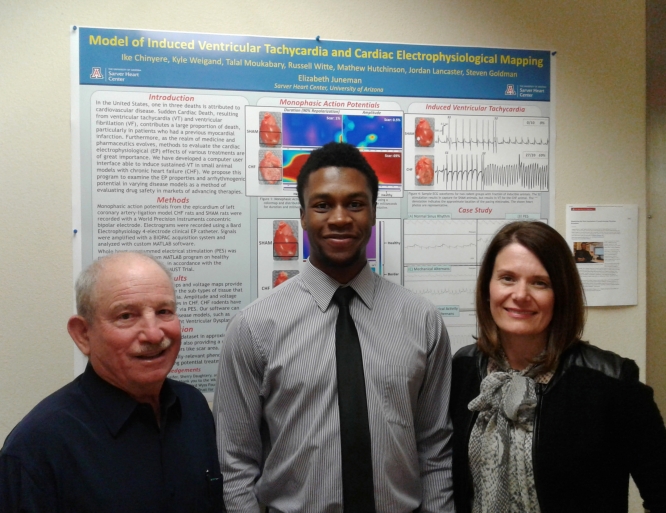
One available seat at a dinner table full of University of Arizona faculty – and his tenacious spirit – led Ikeotunye "Ike" Royal Chinyere to Steven Goldman and Elizabeth Juneman.
Chinyere had been volunteering as an usher during the wedding of a friend, a UA College of Medicine – Tucson student at the time, when he was told to take the open seat next to then-UA faculty member Ana María López. Over dinner, López learned that Chinyere was considering an undergraduate degree in physiology, but was more interested in cardiology.
The following day, López sent Chinyere contact information for Goldman, a cardiologist and researcher who has long supported the training and development of young researchers. Soon after, Chinyere began attending lab meetings and working with Goldman and Juneman at the UA Sarver Heart Center.
"It's pretty rare to have a mentor invested in you and how you do, careerwise, and helps build you along the way," said Chinyere, an Honors College student majoring in physiology, who graduates in May. "To have two who want to see you develop as a person – it's a blessing. I know that I won't be able to fully recognize and appreciate that until down the road."
And what makes the connection even more special is that Goldman once mentored Juneman.
"Our relationship has gone through an evolution from mentor-mentee to current collaborators. Sometimes it is hard to make that transition, but Goldman was good about allowing me to move into that collaborator role. It was seamless," said Juneman, an associate professor of medicine who completed her internal medicine residency and cardiology fellowship at the UA.
Juneman joined the UA faculty in 2007 and worked at the Southern Arizona VA Health Care System, along with Goldman, as director of echocardiography and director of heart failure. In 2014, Juneman moved back to the UA full time as director of outpatient cardiology. Goldman joined the UA in 1975.
"I am blessed that he was my boss and mentor," Juneman said, adding that she was drawn to Goldman's "charismatic form of teaching" and his "infectious kind of personality." He is quick-witted, direct, trusting, and he believes in the necessity and power of collaborative work, she said.
"To collaborate effectively, students must see that research is a team effort; this is not a hierarchical lab," she said. "This is a group of labs that work together to accomplish a common goal," Juneman said. "I attribute a lot of my career, how I teach, how I mentor and my philosophy to this gentleman."
Interestingly, those qualities have also drawn Chinyere to his two mentors.
Under the direction of Goldman and Juneman, Chinyere works as a cardiac electrophysiology research specialist at the Sarver Heart Center.
"He's got the skill set, he's smart, he's got the initiative and the ability to get things done," Goldman said.
"The future is in the young people, and young people have ideas you might not have, so you have to be a fool not to get them involved," he said. If you don't "it is a way to guarantee your own obsolescence."
In the lab, Chinyere is helping develop a program that enables physicians to more quickly gauge the best and safest medications for individual patients seeking treatment for heart failure.
Cardiovascular disease is the leading cause of death in the U.S. As pharmaceutical therapies and treatments advance, methods to evaluate more carefully how a drug, biologic or implantable device interacts with the heart are critical.
"We have developed a software system that is able to perform the same tests done by clinicians in hospitals on multiple disease models. This is different from current research methods because the tests are more holistic and the data is directly applicable to humans," Chinyere said.
"By testing new drugs in our disease models and loading data in our software, we can better assess cardiac safety and prevent harm to patients, as well as save drug developers time and money."
The software has been reviewed by field experts and published, and incorporates several disciplines, including business and engineering. It helps determine which drugs cause heart arrhythmia, or an irregular heartbeat, which could lead to sudden cardiac death, the leading cause of death in patients with heart failure.
Chinyere recently won three research awards, including a grant from BioAccel's "Scorpion Pit" and a PitchFest Award from the UA Office of Student Engagement.
"Mentoring is time consuming, but it is worthwhile," Juneman said. "My hope is that Ike will go on to do phenomenal things, and I will be able to say, 'I knew him when.'"
After graduating from the UA, Chinyere – who was born and raised in Kingman, Arizona – will begin studies at the UA College of Medicine – Tucson as an M.D.-Ph.D. candidate.
Chinyere said he opted to stay in Arizona and chose the UA over Harvard University and Oregon Health and Science University for several reasons. His parents, Andy and Stella, both Nigerian immigrants, have worked as a pharmacist and nurse, respectively, in Arizona since moving to the U.S. He also has two brothers at Arizona institutions: Henry is at Arizona State University studying kinesiology while Jeffry is attending Yavapai Community College studying applied sciences.
Eventually, Chinyere plans to pursue training in cardiology.
"The heart is the pump at the center of us all. It is absolutely necessary for life, and accomplishes an amazing job every single day, hour and minute of our lives. There are many different perspectives of the heart within cardiology – mechanical, electrical, pressures – and they all work together seamlessly."

